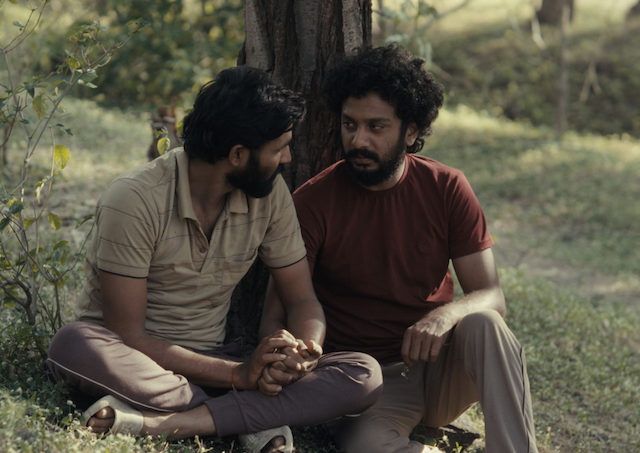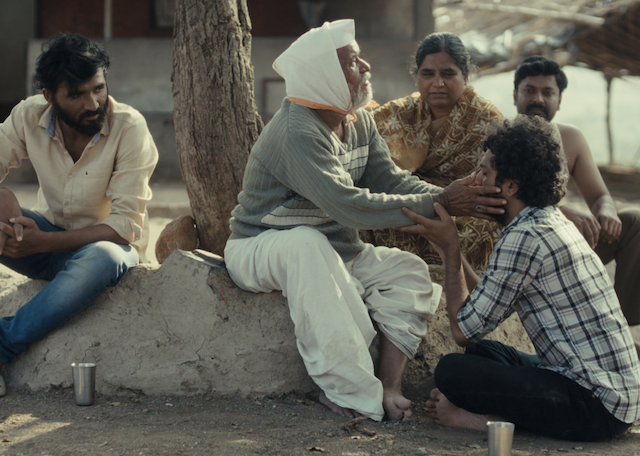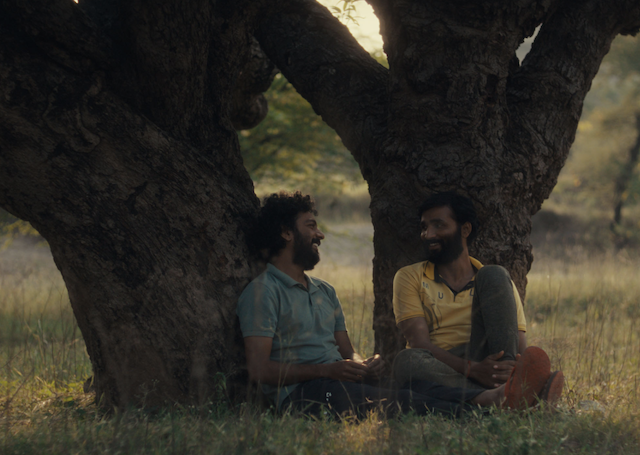
Courtesy of Sundance Film Festival
There are layers behind the title “Cactus Pears“ (Sabar Bonda in Marathi). In these red pears there’s a soft, juicy flesh that’s bursting with sweet flavor. Filled with vitamins, indigenous people have used the juice for centuries to treat burns and hepatitis. It takes years to grow, but the sweetness is eternal. There are thorns covering it, to reach the good parts they must be removed. This is the fruit our two protagonists in “Cactus Pears“ enjoyed as youngsters and is a metaphor for their life. This Marathi-language drama is a warm, melancholic and masterly Indian debut.
Just like reaching the juice in the cactus pears, the obstacles have been many for Anand (Bhushaan Manoj). After the death of his father, the quiet, mild-mannered 30-something gay man returns from the bustling city life in Mumbai to his remote childhood village of Kharshinde in Maharashtra. Initially hoping to stay only two days, he must, urged by his mom Suman (Jayshri Jagtap), participate in the traditional ten-day grieving period and endure the suffocating love of his biological family members and the rules of the mourning ritual. His nagging relatives disturb his grief with questions about when he is getting married to a woman.
Anand withdraws into himself and finds an escape with his childhood friend Balya (Suraaj Suman), a gentle farmer’s son who never left the village. They used to be lovers, sharing memories of climbing mango trees and eating cactus pears. Now they’re trying to carve a space for each other, and themselves.
Director and screenwriter Rohan Kanawade, who previously explored the theme of love between men in rural India in his short films Sundar (2016) and U For Usha (2019), was inspired by the loss of his own father and his experiences as a gay man. His semi-autobiographical feature debut is a sensitive and realistic film that avoids the often tragic and self-pity queer representation in cinema – he’s here defying stereotypes.

Courtesy of Sundance Film Festival
Although his characters find themselves living in a homophobic patriarchy, where intimacy between two men seems nearly impossible, his lovers are portrayed with hope, assured of who they are. Kanawade wants to present that their sexuality can never be the whole identity, that’s a part of your life. Despite the achy longing and the many barriers, they don’t need to stand up to people. Instead, they navigate the complications in their own way, finding their own lives without the need of acceptance and understanding of others or rebellious behavior. Nor are there tragic consequences. It’s refreshing to watch.
The intimate and physical reawakening between Anand and Balya – by a cold river, by a horde of goats, by a large tree – are soulfully described. Never rushed, only gentle. The moments Anand shares with his loving mother are also quiet and honest, their common grief of the father is moving. The parents never rejected Anand for his sexuality, although he is not open in this rural environment. By telling the truth, he is afraid some would start treating his mother badly. Relatives have been told that a girl broke his heart. That’s why he’s single.
The metaphorical cactus pear is seen closely only once. In a key moment of tenderness with his mother, Anand lies next to her as they talk about his childhood and the late father’s drinking. She’s revealing she knows who her son really is. Suddenly Anand receives a cactus pear, a surprise present from Bayla – they are rare to find in the region. The mother warns about the thorns, but they are removed. Arnand eats the fruit and smiles. It’s a wonderful scene, pure and illuminating.
Other interesting and multilayered themes are the relationship between the rural and the urban, and the burden of traditions and cultural norms. Anand left the village for the big city, for obvious reasons, working at a call-center. Perhaps the death of his brother had something to do with his change as well – unspoken motives and sorrows run as a common thread through the film. Anand’s body language, the scruffy hair and weary eyes suggest sorrows for a long time. Although life in the city doesn’t offer utopia and finding love is hard, the city seems to be the only place where he would be able to live.
The film never throws information in your face but tells us what we need to know about Anand, filling the gaps and shifting the mood. Like its main characters, this gem is quiet and hypnotically potent. The equally excellent Indian feature debut, Payal Kapadia’s “All We Imagine as Light,” that many US critic groups named best international film 2024, also depicts the relationship between rural and urban, tradition and modernity. And the achy longing for love in a traditional world.
If that film focuses on women and takes place mostly in the intensity of Mumbai, “Cactus Pears“ hold its gaze on the beauty of the western Indian countryside. It’s very cinematic. DP Vikas Urs’ cinematography lingers with stunning, steady compositions and gorgeous landscape shots. The score is created from natural sound: crickets chirping, leaves rustling, wind blowing, sparrows chirping and cattle bells ringing. The actors’ words are soft, the silence has a meaning. Just like the cactus pear has a healing effect, the film melts the heart and cures the longing. Watching Kanawade’s work is like experiencing the birth of a new Satyajit Ray or Tran Anh Hung. A fresh, tender vitamin kick.

Courtesy of Sundance Film Festival
Grade: A
If you like the video review, share your thoughts below!
Check out more of Niclas’ articles.
Meet the Artist 2025: Rohan Parashuram Kanawade on “Sabar Bonda (Cactus Pears)”

